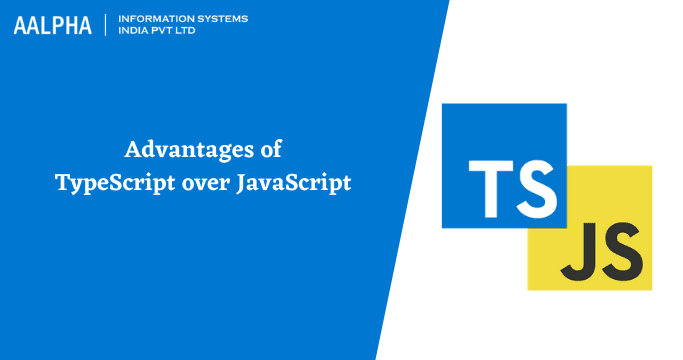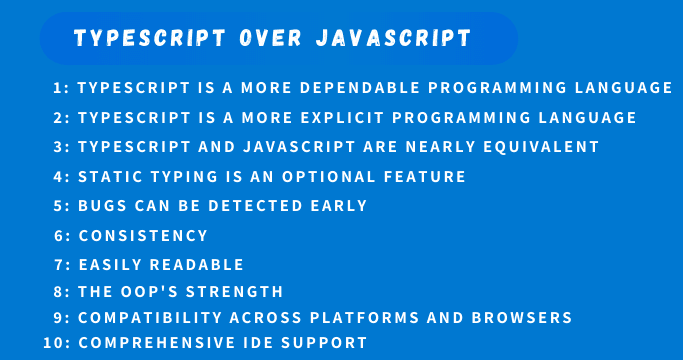For the past few years, TypeScript has grown in popularity. It is listed as one of the five most promising languages for the past few years. In addition, typeScript is used by Angular, one of the most popular frontend frameworks. Around 65% of JS developers currently use TypeScript.
JavaScript has historically been the primary language for scripting web pages and applications on the Internet. However, with frameworks like Node.js and Deno, it is now feasible to utilize JavaScript on both the frontend and backend.
TypeScript is a programming language
TypeScript is a JavaScript superset that supports optional typing and compiles to standard JavaScript. In simplest terms, TypeScript is technically JavaScript with static typing enabled whenever it is desired. According to a study, TypeScript can discover 15% of all JavaScript errors.
Why should you use TypeScript instead of JavaScript?
-
TypeScript is a more dependable programming language
In comparison to JavaScript, TypeScript code is more dependable and refactorable. This helps developers easily avoid mistakes and do rewrites. In addition, types invalidate many trivial errors that may creep into JavaScript codebases and provide a rapid feedback loop for correcting all the minor problems that occur while creating new code or refactoring.
-
TypeScript is a more explicit programming language
Making types clear directs our attention to the details of our system’s construction and the interactions between its many components. It is critical in large-scale systems to abstract away from the rest of the system while keeping the context in mind. This is made possible through types.
-
TypeScript and JavaScript are nearly equivalent
Since JavaScript is a subset of TypeScript, you may include any JavaScript libraries or code in your TypeScript work.
Most popular JavaScript libraries will feature types — Certainly Typed is a repository of types for various JavaScript libraries that you may use to ensure the type of safety of your interactions with them.
This implies that you may integrate TypeScript progressively into your JavaScript codebase.
Read: TypeScript vs JavaScript Differences
-
Static typing is an optional feature
JavaScript is a dynamically typed language, which implies that types are verified during execution, and datatype mistakes are detected only during execution. Thus, type checking at runtime is not in and of itself a disadvantage: It increases program flexibility by allowing components to adapt and alter on the fly. However, as the project and team grow, more undefined variables are introduced, and the code accumulates potential errors.
TypeScript provides the concept of static solid typing as an optional feature: Once defined, a variable retains its type and may only accept specific values. In addition, the compiler notifies developers of type-related errors, preventing them from progressing to the production phase.
-
Bugs can be detected early
TypeScript finds 15% of typical problems at the compilation step, according to researchers. While this is far from a perfect outcome, it is large enough to save engineers time and allow them to concentrate on resolving logic errors rather than identifying common defects. Additionally, submitting the code to a compiler reduces the number of quality assurance and testing tasks.
-
Consistency
With TypeScript, everything is preserved in its original state. For example, if a variable is defined as a string, it remains a string and never be converted to a Boolean value. This increases the chances that functions will perform as intended.
-
Easily readable
Due to the addition of strict types and other self-expressive aspects, you can discern the developer’s design intent when the code was initially written. This is particularly critical when distant teams collaborate on the same project. Thus, a self-contained codebase may compensate for the absence of direct contact between team members.
-
The OOP’s Strength
TypeScript supports class-based object-oriented programming (OOP) principles such as classes, interfaces, and inheritance. The OOP paradigm helps develop well-organized, scalable code, which becomes more apparent as your project develops in size and complexity.
-
Compatibility across platforms and browsers
Each device, platform, and browser that supports JavaScript also supports TypeScript once the compiler converts it to vanilla JS. Typically, integrated development environments (IDEs) and editors that support TypeScript provide a built-in TypeScript compiler (TSC). Thus, typeScript enables conversion of a subset of the codebase or the whole application at once.
-
Comprehensive IDE support
Type information makes editors and integrated development environments (IDEs) far more helpful. They may include capabilities like code navigation and autocompletion, which provide precise recommendations. Additionally, you get feedback when typing: The editor immediately indicates any mistakes, including type-related ones. All of this contributes to the development of maintainable code and resulting in a considerable increase in productivity.
Final Remarks
In general, TypeScript is an excellent tool to have in your toolbox, even if you are not using it to its full potential. It is simple to start small and expand gradually, learning and adding new features along the way. There is no need to be terrified of TypeScript since it is pragmatic and inviting to newcomers.
For more information, feel free to contact us today!





Share This Article:
Written by:
Muzammil K
Muzammil K is the Marketing Manager at Aalpha Information Systems, where he leads marketing efforts to drive business growth. With a passion for marketing strategy and a commitment to results, he's dedicated to helping the company succeed in the ever-changing digital landscape.
Muzammil K is the Marketing Manager at Aalpha Information Systems, where he leads marketing efforts to drive business growth. With a passion for marketing strategy and a commitment to results, he's dedicated to helping the company succeed in the ever-changing digital landscape.